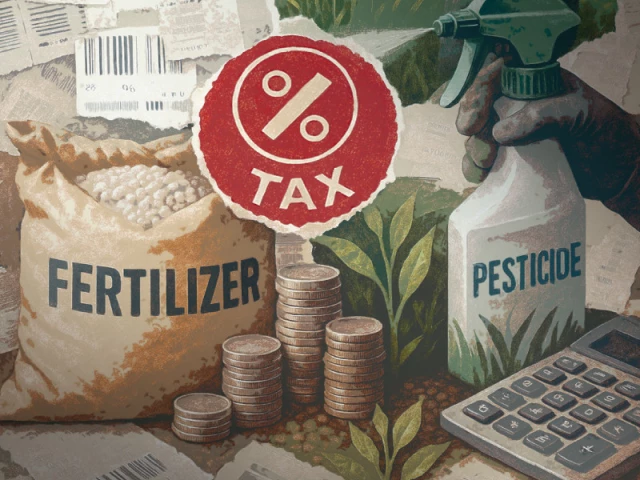IMF pushes for taxes on farm inputs
Govt seeks one-year deferral as floods devastate Punjab farmland

The International Monetary Fund (IMF) has once again raised the issue of imposing additional taxes on fertiliser and introducing an excise duty on the use of pesticides to partly offset a shortfall in the annual tax target, which the government has requested to defer until next year.
The global lender has asked the government to trigger the contingency measure by doubling the federal excise duty rate on fertiliser to 10% and introducing a 5% federal excise duty on pesticides, according to government sources involved in the negotiations with the IMF. Sources said that during ongoing discussions, the IMF team observed that the Federal Board of Revenue (FBR) may fall short of its target by at least Rs400 billion to Rs500 billion, depending on multiple factors.
However, the IMF may not immediately cut the target or press to cover the entire projected shortfall through additional measures. With only two days left in the conclusion of the talks, there is a possibility that the IMF may agree to reduce the target in the range of Rs167 billion to Rs240 billion, the sources added. The development comes at a time when at least 3.3 million acres of land are under water in Punjab, and 27 districts, mostly rich in cash crops, have suffered medium to high losses. The provincial government is finalising an assistance package.
Officials said the IMF did not press hard after the government assured it that it would take these measures during the next review if the FBR's tax collection remains lower than the revised estimates.
The issue remains open for discussion, and the final position will be known once the last draft of the Memorandum of Economic and Financial Policies (MEFP) – the set of conditions Pakistan will follow for the next review – is shared.
The government had set a Rs14.13 trillion tax target for the FBR, but during the first quarter, the collection fell short by Rs198 billion.
The new FBR target could be between Rs13.963 trillion and Rs13.89 trillion, according to FBR officials. They said the revision might involve reducing the sales tax target by Rs240 billion to slightly under Rs7 trillion for the current fiscal year.
The agriculture sector is already struggling after the government abruptly withdrew the agricultural support price mechanism without timely notice to farmers, said Syed Naveed Qamar, former finance minister under the Pakistan Peoples Party (PPP). Qamar said his party would oppose any move that increases the cost of agricultural inputs, particularly at a time when floods and the withdrawal of the wheat support price have negatively affected farmers' incomes. The sector has been grappling with climate change and limited water availability, he added.
Meanwhile, the Sindh government on Monday extended the deadline for filing Sindh Agricultural Income Returns by one month to October 30, according to a notification by the Sindh Revenue Board. This will be the first income tax return that the farming community will file under new provincial income tax laws, enforced as part of the $7 billion IMF bailout package.
The issue of increasing taxes on fertiliser and pesticides also surfaced in June this year. However, following opposition from the PPP, Prime Minister Shehbaz Sharif requested the IMF to defer the matter. If the government's latest deferral request is accepted, this will be the second time in three months that the IMF has altered its stance on the issue.
However, the IMF's renewed focus on the matter raises questions about timing, given the severe strain the agriculture sector is already facing. The sector has suffered losses, and as a result, overall economic growth will likely remain below target.
Against the government's target of 4.2%, sources said the IMF has projected economic growth to range between 3% and less than 3.5% for the current fiscal year.
The IMF noted that recent floods have weighed on the outlook, particularly for the agriculture sector, given the damage to major Kharif crops. The lender continues to project relatively lower economic growth over the medium term.
Sources said the IMF believes that effective implementation of economic policies can help the economy entrench macroeconomic stability, boost external competitiveness, and improve the business environment for the private sector, supporting a gradual growth pickup to 4.5%.
At the time of negotiations for the $7 billion bailout package, the federal government had committed to ending preferential treatments to reduce distortions. It explicitly told the IMF that "its large-scale interventions in markets for agricultural commodities, including fertilisers, are no longer fit for purpose" in ensuring food security.
The low or no federal excise duty (FED) rate on fertilisers and pesticides has been described "distortions stifling private sector activity and innovation, exacerbated price volatility and hoarding, and placed fiscal sustainability at risk".
Both the IMF and the federal government believe that farmers' excessive use of fertilisers contributes to environmental pollution.
Meanwhile, Planning Minister Ahsan Iqbal on Monday chaired the first meeting of the Cabinet Committee on Agriculture, Climate and Flood Emergencies, constituted by the prime minister.
The minister stressed the urgency of supplying canola seeds to farmers within 15 days to take advantage of soil moisture left by the floods. "I have arranged a 5,000-acre canola seed pilot project in Narowal through corporate sponsorship because we cannot afford to lose time. This is a moment for urgent action – we must not waste it," he said. Iqbal also established three task forces, which will prepare detailed reports on immediate agricultural relief and seed provision, climate change impacts and resilience strategies.























COMMENTS
Comments are moderated and generally will be posted if they are on-topic and not abusive.
For more information, please see our Comments FAQ